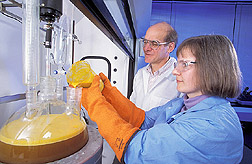Biofuel Gets Less Expensive |
|
|
|
Being stuck in a traffic jam may be a bit more bearable if the aroma of fresh french fries was in the air, rather than the noxious stink of fossil fuel exhaust. When scientists at the Eastern Regional Research Center (ERRC) recently tested biodiesel fuel produced from soybean soapstock—an abundant but underused byproduct of vegetable oil refining—they found its composition, engine performance, and emissions to be comparable to those of biodiesel fuels presently on the market, which are made from highly refined edible oils. The french-fry aroma, another typical trait of current biodiesel fuels, was an added bonus. Biodiesel is the term given to diesel engine fuels made from agricultural fats and oils. There is much interest in the use of biodiesel throughout the world because it is made from renewable resources and reduces air-polluting emissions by diesel engines. ARS research chemist Michael J. Haas and biologist Karen M. Scott teamed with research scientist Scott Bloomer—then at the international agricultural company Cargill in Minneapolis, Minnesota—to develop a chemical method that converts all forms of fatty acids found in lipids of soybean soapstock into simple methyl esters. The researchers have applied for a patent on the method. Haas, Thomas A. Foglia, and other ARS researchers with ERRC's Hides, Lipids, and Wool Research Unit in Wyndmoor, Pennsylvania, are interested in using lower value lipids derived from animal fats, vegetable oils, and recycled greases as raw materials for biodiesel production. They want to make biodiesel more attractive economically while reducing use of imported fossil fuels and increasing use of renewable, agriculture-based products. Many commercially available biodiesel fuels are made from refined soy oil and are then added to diesel, typically at levels of 20 percent of the mixture's volume. According to Haas, studies show that biodiesel, used alone or in such blends, can provide much needed lubrication to fuel systems while also reducing production of polluting exhaust emissions. Because of these benefits, Haas points out, there is strong interest in this country and around the world in developing methods to produce biodiesel from fats and oils. Originally, methods were designed to produce biodiesel from highly refined oils. Now Haas, Scott, and Bloomer have modified the technology to allow use of lower value, less pure lipids, such as soapstock, as starting materials. This could increase availability of biodiesel while decreasing its cost. Soybean oil soapstock is a plentiful and relatively inexpensive byproduct of edible-oil refining. About 100 million pounds are produced in the United States every year, and it can be had for one-tenth or less the cost of refined vegetable oil, Haas says. Currently, it is used mostly as a cheap source of fat in livestock feeds. However, by implementing processes such as the one developed by Haas and Bloomer, the agents in soapstock could one day serve as the source of more than 6 million gallons per year of diesel engine fuel or fuel additives and in other applications such as cleaning agents and organic solvents. Other ARS scientists have patented another method to develop biodiesel and lubricants, as well as fuel and lubricant additives. This enzymatic method, invented by ERRC researchers Foglia, William N. Marmer, and Lloyd A. Nelson, uses animal fats, vegetable oils, rendered fats, and restaurant grease to produce the fatty acid esters that can be used as biodiesel and lubricants. Because conversion of grease, in particular, was very effective and inexpensive, grease-derived biodiesel could be used in conjunction with soybean oil derivatives to reduce costs.—By Jim Core, Agricultural Research Service Information Staff. This research is part of Bioenergy and Energy Alternatives, an ARS National Program (#307) described on the World Wide Web at http://www.nps.ars.usda.gov. Michael J. Haas is in the USDA-ARS Hides, Lipids, and Wool Research Unit, Eastern Regional Research Center, 600 East Mermaid Lane, Wyndmoor, PA 19038; phone (215) 233-6459, fax (215) 233-6795. |
|
"Biofuel Gets Less Expensive" was published in the April 2002 issue of Agricultural Research magazine. |







